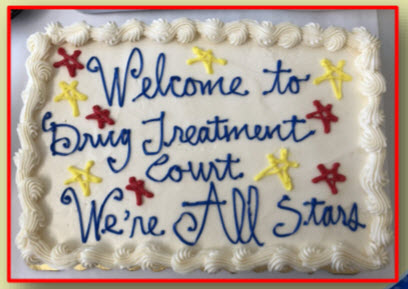Location: Vancouver, BC
Opened: December 4, 2001
Contact to participate:If you want to plead guilty and are ready to commit to a minimum of nine months of treatment in the Drug Treatment Court Vancouver (DTCV) described on this page under Operation, speak to your lawyer or Duty Counsel.
If you meet the program’s criteria, they can talk to the Drug Treatment Court prosecutor for you. Both provincial and federal charges may be dealt with. You can also apply to have charges waived to DTCV from anywhere in B.C.
To participate in the program you must have housing in the Lower Mainland. If you do not have or are unable to obtain housing that meets the program’s requirements, the DTCV Treatment team will arrange housing once you are admitted.
Specialized Work
- The Drug Treatment Court of Vancouver (DTCV) uses a therapeutic or problem-solving approach to sentence people who commit offences to support their addiction to drugs.
- The approach involves collaboration among judges, prosecutors, defence lawyers, Community Corrections, and health and social service agencies to help offenders (called “clients” in DTCV) overcome substance abuse and reduce the harms caused by addiction.

Operation
- Prosecutors screen people who apply to plead guilty in DTCV to see if they are eligible. See the DTCV Fact Sheet for the things prosecutors consider.
- The judge imposes strict bail conditions for clients. These usually include:
- reporting to court regularly
- random urine testing,
- • taking part in an intensive treatment program of at least nine months through the Drug Court Treatment and Resource Centre.
- This four-phase treatment program is located outside Vancouver’s Downtown Eastside. It operates five days a week. Its staff includes an integrated team of probation officers, addiction counsellors, doctors, health care workers, and an employment assistance worker. They offer a broad range of services to address clients’ complex needs, including addictions treatment, health care, psychiatric care, housing, financial assistance, life skills training, education, and leisure activities.
- Regularly scheduled court appearances are a key part of DTCV. The DTCV judge hears progress reports and gives clients incentives for progress (like praise from the judge, applause from everyone in court, and gift cards contributed by local businesses) and sanctions for failures to obey their bail order (like reprimands by the judge, essays, time in jail, or discharge from the program).
- A client graduates from DTCV if they meet all these requirements:
- they have not used illegal drugs for at least three consecutive months immediately before graduation
- they have engaged in secure employment, training, or volunteering
- they live in stable, approved housing
- they have not been charged with a new offence in the six months immediately before graduation.
- A graduate receives a certificate and is sentenced to a non-custodial sentence in a graduation ceremony held in open court and celebrated with other DTCV clients and team members.
The DTCV sits Tuesdays and Thursdays at the Vancouver Provincial Court, 222 Main Street.
BC Public Service Video - 2.5 hours
The Court does not endorse any advertisements associated with this video.
Development
- DTCV was created, in part, as a response to the deaths and major health issues rampant in the Downtown Eastside of Vancouver due to the illegal drug trade.
- The BC Provincial Court recognized that a new approach to the prosecution and sentencing of drug-addicted offenders was needed. The idea was to address the root cause of street crime – drug addiction – in order to reduce criminal offending.
- DTCV was the second court of its kind to open in Canada. Its integrated team approach was modelled on similar courts in the United States.
- DTCV team members speak at local, national, and international training conferences. DTCV is affiliated with organizations including:
- Canadian Association of Drug Treatment Court Professionals (CADTCP)
- National Association of Drug Treatment Courts (NADTC)
- International Association of Drug Treatment Courts (IADTC)
Goals
DTCV’s goals include:
- Rehabilitating offenders by:
- having clients achieve and maintain abstinence from illegal drugs
- improving clients’ physical, emotional, and mental health and well-being
- improving clients’ housing, life skills, employment, and education
- Promoting safer communities and protecting the public by reducing criminal offending
In 2011 Dr. Julian Somers of the Faculty of Health Sciences at Simon Fraser University conducted an evaluation of DTCV. His analysis showed that DTCV participants’ drug-related recidivism was reduced by 56% over a two-year period. Their overall criminal re-offending was lowered by 35%, even though at least 50% of the participants were considered to be at “severe” risk to re-offend.
In April 2012, the DTCV received the Premier’s Innovation and Excellence Award for the Lower Mainland in recognition of the integration and excellent work of the multiple teams involved in the treatment, support, and recovery of DTCV participants.
Community partners
- Probation officers, addiction counsellors, doctors, health care workers, and an employment assistance worker treat DTCV’s clients through the Drug Court Treatment and Resource Centre.
- Community partnerships change over time depending on clients’ needs and programs’ availability. Other partners currently include or have included:
- an Indigenous-led program, the “Talking Circle”
- Mission Possible and other employment programs like WorkBC
- Art therapy and other programs created by counselling students
- the UBC Faculty of Dentistry
- a local musician and drumming teacher
- Connective (formerly John Howard Society)
More information
DTCV Fact Sheet - August 2022
Vancouver drug treatment court builds record of success, Vancouver Sun, March 7, 2016 – article capturing the spirit of DTCV
Drug Treatment Court celebrates a graduation -eNews
Vancouver Drug Treatment Court – meeting COVID with creativity & flexibility - eNews
Drug Treatment Court of Vancouver (DTCV): An Empirical Evaluation of Recidivism 2011

